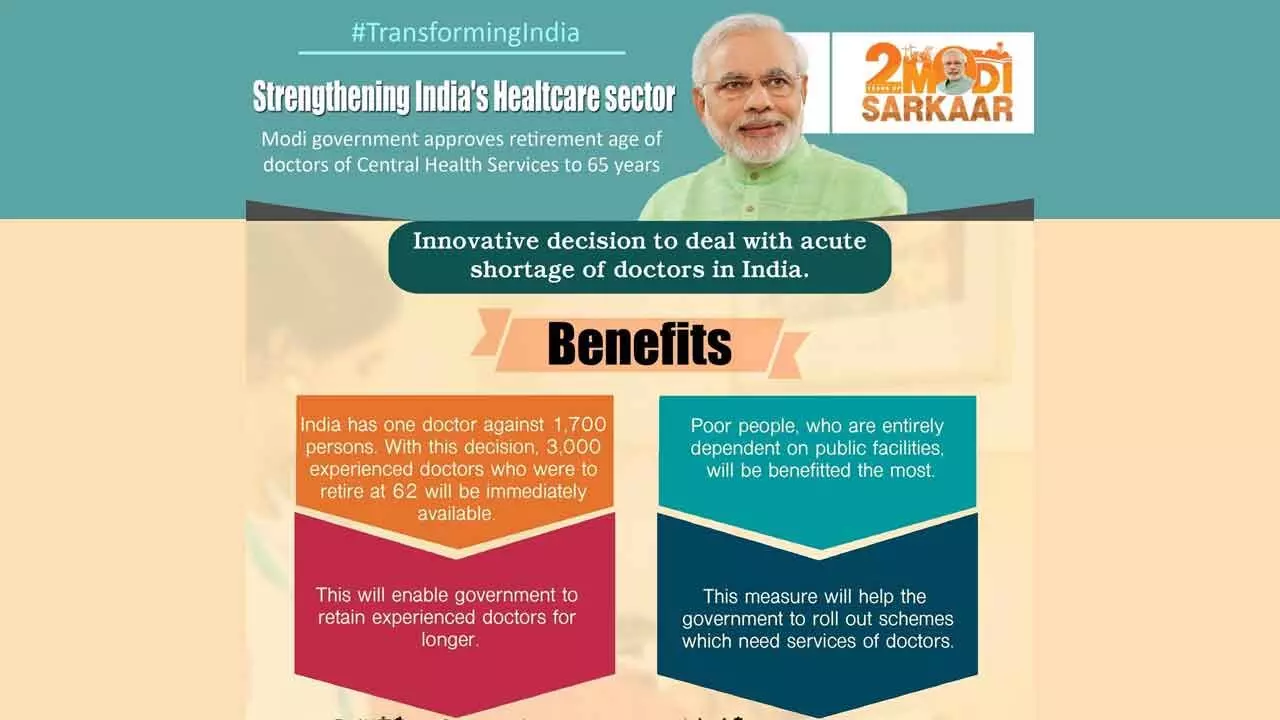Increasing The Retirement Age Of Govt Doctors Can Boost The Country’s Health
There is a worrying shortage of specialist doctors in community health centres across rural India
Increasing The Retirement Age Of Govt Doctors Can Boost The Country’s Health

In the US and Europe, doctors associated with research work remain in service for their entire life. When such a healthy system can prevail in other countries, it makes one wonder why should doctors in India be denied such a service-oriented privilege
India can take a vital step towards the well-being of its citizens by increasing the retirement age of government doctors, including central and state governments. In recent decades, the average lifespan of Indians has been steadily improving and the country has made significant progress in healthcare, technology and living standards. The average life expectancy has risen from about 37 years in 1950 to about 70 years now.
However, despite these phenomenal advancements, the retirement age of doctors has not kept pace with the changing times. Although the retirement age of doctors has been set at 65 years, there is scope to increase it further, especially because of a shortage of doctors in government hospitals.
The time has come to increase the retirement age of doctors to 70 years. You will find hundreds of doctors in the country who are practicing even beyond 70 years of age.
For instance, Dr. R.K. Caroli, a cardiologist associated with Ram Manohar Lohia Hospital (RML) in Delhi, used to see patients for four to five hours every day until the age of 90. He was the physician of former prime ministers Pandit Jawaharlal Nehru and Lal Bahadur Shastri. Likewise in Mumbai, renowned heart specialist Dr. B.K. Goyal was active after seeing more than 80 springs. One can name several such age-defying active doctors in a jiffy.
Many new medical colleges are in the pipeline as the government is trying to get more than 50,000 doctors every year from such institutes. Besides these, there are also doctors who are headed home after obtaining their medical degrees abroad. This is enough evidence that the number of doctors in the country will continue to grow at a steady pace. Keeping this in mind, it is also necessary to ensure that the country's health sector benefits from the experience of senior doctors. After all, there can be no substitute for experience.
Dr. Vinay Agarwal, former president of the Indian Medical Association (IMA), believes that increasing the retirement age of government doctors to 70 will not only alleviate the shortage of experienced doctors, but will also provide young doctors with necessary mentorship.
In fact, experience matters a lot in the world of medicine. When a young man joins a medical college, he stays in touch with experienced doctors in addition to his teachers for guidance. Therefore, it is very important that the experience of senior doctors remains available to those who are coming into this profession. Senior doctors and the enthusiastic new doctors can work together and provide top-grade treatment.
In the circumstances, increasing the retirement age of government doctors can be a welcome forward step. Since doctors take great care of their health, they are fit enough to work till the age of 70 years.
One need not be told that there is a severe shortage of experienced doctors in the rural parts. The situation is so bad that people from the interiors go to hospitals in the nearest big city for treatment, irrespective of the nature of illness.
Every day, thousands of people from far-flung states go to AIIMS, Ram Manohar Lohia Hospital and Lok Nayak Jai Prakash Hospital in the national capital for treatment. If adequate doctors and superior facilities are made available in the interiors, why would villagers come hundreds of miles away for treatment? The prevailing inadequacies are adding to their time, tension and worries that the sickness could aggravate even if there is a day’s delay.
Increasing the age of government doctors can, to some extent, fill the shortage of doctors in villages. There is a severe shortage of specialist doctors in community health centres in rural India. This is a very worrying situation. One solution to this problem is that by increasing their retirement age, government doctors posted in the interiors can continue to serve the locals for another five years.
Dr. Vinay Agarwal says that there is a need to fulfill the demand for surgeons, obstetricians and gynecologists, physicians and pediatricians in rural parts of the country. Increasing the service period of doctors will greatly remove the shortage of specialist doctors in the villages, he said.
Senior doctors often play a vital role in health sector management and policy making. Their service extension will ensure that their expertise can be used in shaping policies and improving hospital management.
In 2017, the retirement age for doctors of the central government was increased to 65 years to retain experienced medical professionals for a longer time. Now the need of the hour is to increase the retirement age of doctors associated with all central and state government hospitals.
In the US and Europe, doctors associated with research work remain in service for their entire life. When such a healthy system can prevail in other countries, it makes one wonder why should doctors in India be denied such a service-oriented privilege.
India always has a demand for experienced doctors. The time has come for India to review the retirement age for its doctors. It is to be hoped that the government will take a decision in this regard soon.
(The author is Delhi-based senior journalist and writer. He is author of Gandhi's Delhi which has brought to the forth many hidden facts about Mahatma Gandhi)

